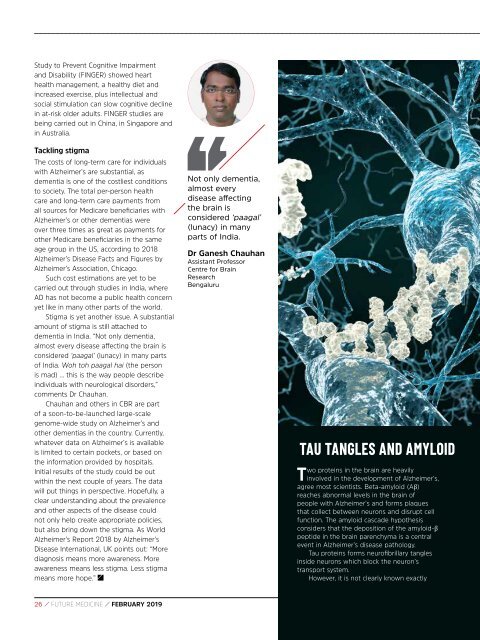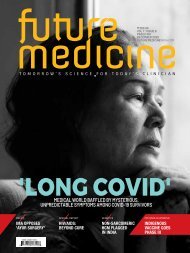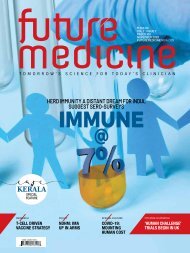You also want an ePaper? Increase the reach of your titles
YUMPU automatically turns print PDFs into web optimized ePapers that Google loves.
Study to Prevent Cognitive Impairment<br />
and Disability (FINGER) showed heart<br />
health management, a healthy diet and<br />
increased exercise, plus intellectual and<br />
social stimulation can slow cognitive decline<br />
in at-risk older adults. FINGER studies are<br />
being carried out in China, in Singapore and<br />
in Australia.<br />
Tackling stigma<br />
The costs of long-term care for individuals<br />
with Alzheimer’s are substantial, as<br />
dementia is one of the costliest conditions<br />
to society. The total per-person health<br />
care and long-term care payments from<br />
all sources for Medicare beneficiaries with<br />
Alzheimer’s or other dementias were<br />
over three times as great as payments for<br />
other Medicare beneficiaries in the same<br />
age group in the US, according to 2018<br />
Alzheimer’s Disease Facts and Figures by<br />
Alzheimer’s Association, Chicago.<br />
Such cost estimations are yet to be<br />
carried out through studies in India, where<br />
AD has not become a public health concern<br />
yet like in many other parts of the world.<br />
Stigma is yet another issue. A substantial<br />
amount of stigma is still attached to<br />
dementia in India. “Not only dementia,<br />
almost every disease affecting the brain is<br />
considered ‘paagal’ (lunacy) in many parts<br />
of India. Woh toh paagal hai (the person<br />
is mad) … this is the way people describe<br />
individuals with neurological disorders,”<br />
comments Dr Chauhan.<br />
Chauhan and others in CBR are part<br />
of a soon-to-be-launched large-scale<br />
genome-wide study on Alzheimer’s and<br />
other dementias in the country. Currently,<br />
whatever data on Alzheimer’s is available<br />
is limited to certain pockets, or based on<br />
the information provided by hospitals.<br />
Initial results of the study could be out<br />
within the next couple of years. The data<br />
will put things in perspective. Hopefully, a<br />
clear understanding about the prevalence<br />
and other aspects of the disease could<br />
not only help create appropriate policies,<br />
but also bring down the stigma. As World<br />
Alzheimer’s Report 2018 by Alzheimer’s<br />
Disease International, UK points out: “More<br />
diagnosis means more awareness. More<br />
awareness means less stigma. Less stigma<br />
means more hope.”<br />
Not only dementia,<br />
almost every<br />
disease affecting<br />
the brain is<br />
considered ‘paagal’<br />
(lunacy) in many<br />
parts of India.<br />
Dr Ganesh Chauhan<br />
Assistant Professor<br />
Centre for Brain<br />
Research<br />
Bengaluru<br />
TAU TANGLES AND AMYLOID<br />
Two proteins in the brain are heavily<br />
involved in the development of Alzheimer’s,<br />
agree most scientists. Beta-amyloid (Aβ)<br />
reaches abnormal levels in the brain of<br />
people with Alzheimer’s and forms plaques<br />
that collect between neurons and disrupt cell<br />
function. The amyloid cascade hypothesis<br />
considers that the deposition of the amyloid-β<br />
peptide in the brain parenchyma is a central<br />
event in Alzheimer’s disease pathology.<br />
Tau proteins forms neurofibrillary tangles<br />
inside neurons which block the neuron’s<br />
transport system.<br />
However, it is not clearly known exactly<br />
26 / FUTURE MEDICINE / <strong>FEBRUARY</strong> <strong>2019</strong>


















